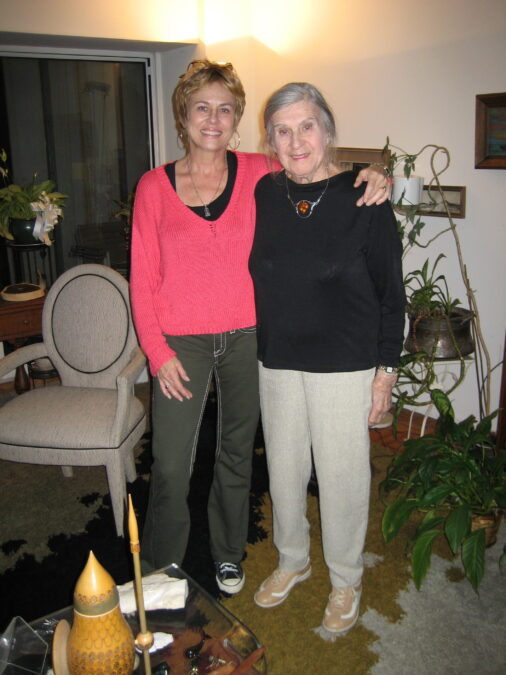During the late nineties I worked on a memoir for Grace Slick, lead singer of Jefferson Airplane fame. She and her friend, Janis Joplin, were two of the first women rock and rollers and they were known for being outrageous and unpredictable. I worked with Grace for six
months and she was unapologetically herself all the time. She had a lot to say about aging which she wasn’t too happy about.
“I was walking around my house a few days ago,” she said, “ and I passed a photo hanging on the wall of Janis and me. We were in our late twenties, we were dead-panning the camera and the photo became a classic. A little further down the hall, there was a mirror.
When I looked into it, I gasped. I thought there was a stranger in my house. I kept looking from the photo to the mirror. Who was that old lady looking back at me? She didn’t resemble the photo next to it at all.”
I understand. I have photos from my ballet days and I look vastly different, but I don’t have the urge to change anything. I have no judgments on people getting face lifts or using fillers. I think everyone should do what makes them comfortable but that isn’t for me. I want to go through every natural phase of life to see what it is, where it’s taking me and the lessons that are there for me to learn.
If we don’t like what we see in the mirror, instead of shaming ourselves, it might be a good idea to stop looking outward and start looking in. Maybe that’s the gift of not liking what we see. We have an opportunity to change our focus and be with ourselves in a less
superficial way. A friend of mine was joking about being glad her eyesight was getting bad so she couldn’t get a clear picture of how she looked. But what if it isn’t a joke? What if it’s a gift in disguise? I’m trying to find grace in aging instead of making it wrong or ugly. You don’t see children feeling shame about being young. So why should we feel shame about being old? They’re both a part of being human.
Eleanor Roosevelt said, “Beautiful young people are accidents of nature, but beautiful old people are works of art.”
I recently saw a photograph of an elderly Native American woman whose face was so wrinkled, it looked like a roadmap of her life. I was taken with her beauty. It felt like her wisdom was tattooed on her face. Every wrinkle told a story of laughter, tears, resilience and suffering. I felt drawn to her. I wanted to know her and learn from her
It’s so much easier to accept aging when you’re in a culture that honors and appreciates elderly wisdom more than the stuff we have
and the way we look. Wisdom offers us a way out of anxiety. A way into compassion and peace. A way out of depression. A way into acceptance and love. Buddhist philosophy tells us that we can’t age gracefully unless we live gracefully. A friend who is thirty years my junior asked me how it felt to be in my seventies. I said, “It’s strange. I never imagined I would get this old but I want is to do this aging thing with some dignity.”
I starred in a movie when I was nineteen and when I watched it back the, I judged myself. I wasn’t pretty enough. I wasn’t skinny enough. On the first day of shooting, I heard a playback of my voice and it sounded so bad to me, I thought they were going to fire me. Fast forward five decades and when I view the movie now, I see that I
am all of those things that I had wanted to be. I had been criticizing myself so harshly, I couldn’t see the truth of who I was.
At this stage in my life, I’m working at accepting change. As a society, we’re not good at it. But if we can find the courage to do it, the reward is finding some peace. Everything that is alive changes and so do things that are not alive. The chair I’m sitting in right now is showing wear on its arms. The leather is pulling away from the
wood and the metal is slightly rusting. I feel attached to it but I’ve decided to replace it and learn to appreciate the one that takes its place.
There is a story about a woman, Charlotte, who went into her garden every morning. She was 88, her joints protested, but she took a great deal of pleasure from her beautiful roses. She had planted them when she was young, promising herself that she would spend
time with them some day. Now “some day” was here. She sat there for hours and her neighbors asked her if she ever got lonely. She said that she got lonely when she looked back. But she had learned to be present by feeling the warm sun on her hands, hearing the birds and watching the roses come into bloom. She saw aging not as a closing but rather as a slow transformation into something
freer. As she sat in her chair with petals blooming at her feet, Charlotte felt herself blooming, too.
I’ve been talking to some friends of all different ages and here’s a summary of what they told me:
When you turn 40, you think you’re not
young any more
When you turn 50, you think you’re getting old.
When you turn 60, you think you are old.
When you turn 70, you think you’re really old and you keep thinking about dying.
When you turn 80, you don’t careany more. Go figure.
Mark Twain said, “Age is an issue of mind over matter. If you don’t mind, it doesn’t matter.”


Recent Comments